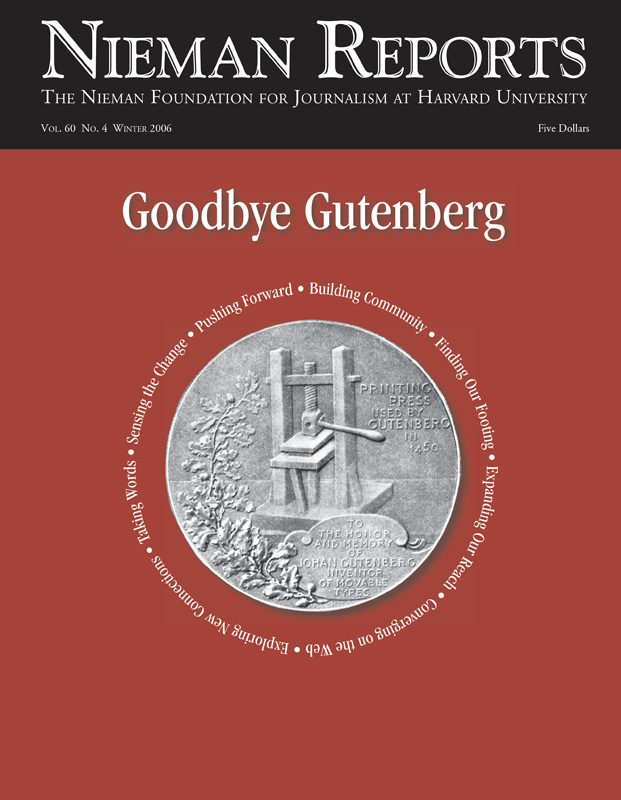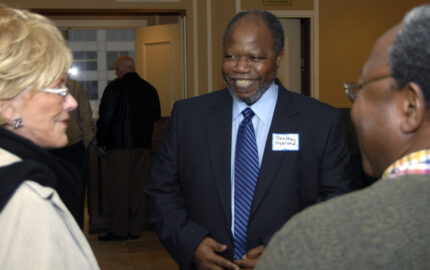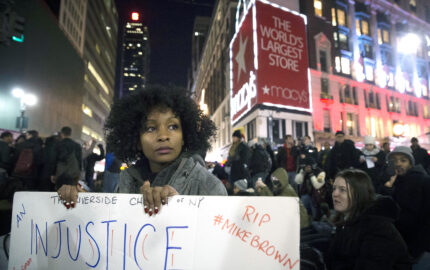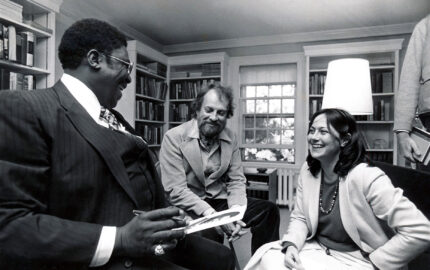In 1962 I walked into the White Plains, New York Reporter-Dispatch (R-D) and asked for a reporting job. Editor Bill Bookman asked a few questions—would I work nights? Did I have a car? When could I start? It was all easier in the manual typewriter days, no personnel forms, no writing tests.
The night shift on an afternoon paper was interesting. It meant covering police news and government boards in a string of affluent Westchester County towns—on-the-job training. The second or third night on the job I was reading the log at Greenburgh, New York police headquarters when two cops literally carried a blood-soaked fellow into headquarters, while a third cop trailed carrying a short shotgun.
The obviously drunk suspect had just shot his wife. It was her blood on him. I immediately trolled for details and got live quotes from the officers. Back at the office later I dug into the story and shortly had a two-take story of a lively domestic murder.
The next day I searched the paper in vain for my story. When I got to the office for my shift I found the copy on my typewriter with a note from the city editor to the effect that the R-D did not print stories of local violence by Negroes. The term "black" was not in use then.
Welcome to the world of American journalism pre-civil rights era. There were all kinds of unsaid rules and regulations about all the news fit to print in those days. They quickly made me understand why my fellow reporters were so cynical and callous. The play/movie "The Front Page," heretofore a comedy to me, suddenly became a documentary.
The years slipped by and the rules continued. The most basic were that reporters knew more than they wrote and editors slept better when their AUTHOR'S NOTE
In the late 1960's I was among the first "official" investigative reporters, duly certified by the American Press Institute at Columbia University. I believe it was my articles about organized crime in New Jersey—pre-"The Sopranos"—that got my Nieman ticket punched.papers operated on the "Afghanistan" principle—all the details when the story was farthest from the newsroom, but when the story was in the circulation area, well, best keep the bulls and sacred cows quiet. That all changed in 1972, of course, with Watergate and the two unknown Washington Post reporters, backed by a gutsy lady publisher and her brave editors.
When I reported for Niemanry in September 1972, however, that journalism sea change was not complete. But it was time for the second odd murder, as yet unsolved. The class of 1973 —as tradition held—met with university big shots and medium shots at the first introductory reception. One of the Harvard medium shots was Joseph Strickland, a 1969 Nieman Fellow, ex-Detroit reporter turned graduate school scout for worthy minority students. We fell into conversation and a few scholarly arguments. He won a few; I won a few. At the end of the evening he needed a lift to Roxbury, so we continued our seminar in the car. He declined my offer to take him to his apartment for, as he said, it was not safe at night for a white guy in that black district.
Two days later we awoke to read in The Boston Globe that Strickland had been shot to death in his apartment by a small caliber pistol, and no robbery motive was apparent. I called the Boston detective handling the case and explained how and where I had dropped Strickland.
The story was a two-day news affair because of the Harvard connection. The detective felt Strickland knew his killer, and perhaps it was a romance gone awry. Then and now I feel the case for the Boston cops was strictly a 9-to-5, no overtime, 33-year cold case and no solution before the last commercial. Over the years I often think that Strickland and I might have had lots of good arguments and conversations.
It was later in October when I fell into conversation with Nieman luncheon guest Ben Bradlee, whose brow was wrinkled with worry about the irregular series The Washington Post was running about the Watergate break-in fiasco. Bradlee was worried because: a) most daily papers were not picking up the Woodstein articles on the Post wire, and b) Bradlee was unsure where the story was going and how much it could cost the Post if the story were a bust.
With the confidence that comes with a grasp of the obvious, I told Bradlee that of the 1,700-plus daily papers in the United States, about 1,650-plus would endorse Nixon for a second term—thus the lack of interest in the ongoing series. Nixon took 49 states. And it took the unraveling Watergate thread two more years to drive Nixon from office.
The Ground Shifts
Watergate was a sea change for American newspapers on many counts—first, a new generation of reporters wanted to be investigators driving the wicked from office. The story drew young people to the trade and to journalism classes and programs all around the nation. By the mid 1970's the movie "All the President's Men" made the young eschew banks and brokerage houses for a manual typewriter.
During that period I taught news writing at two colleges and warned my students—as did an article in The Wall Street Journal—that while there were about 30,000 journalism students, Woodstein wannabes, there were about 300 jobs in the trade available for cub reporters—maybe.
During that same period an undercurrent ran little recognized outside the business offices of newspapers. The 19th century newspaper industry was colliding with reality—hot type to cold type and union-manning rules fighting with financial efficiency. The collision resulted in the 88-day New York newspaper strike of 1978 that drove me out of the newsroom and to the corporate world, where—amazing!—they had electric typewriters and, soon, computers.
From 1983 all my writing was done on a computer, including a couple of novels. Big business paid the mortgage, and when folks occasionally asked if I missed daily newspapers, I would reply, "Sure, the way I miss steam locomotives."
By the early 1990's, it was apparent to all but the really dense that there was a new form of communication that would challenge the traditional news gatekeepers. Reporting and all else had changed radically—first e-mail, then the novelty of the Web.
In that period I connected with a Web pioneer in Durham, North Carolina, who framed and developed one of the first Web magazines devoted to columns and editorials on books, music, cuisine and my irregular rants on whatever irritation moved me. I called my contribution The Electric Ikonoklast. Soon I found I had readers responding from Denver, Colorado, and Kunming, China, and places in between. The Web magazine, which had readers in more than 150 nations, lasted about seven years—to the death in 2004 of its founder-editor, radio and television veteran Richard Hughes.
During the same period—late 1990's—I became involved with a novel daily Web newspaper on Cape Cod, perhaps a first local daily in the United States without a print version. As I had done in White Plains, I wandered into its tiny office in affluent Osterville, Massachusetts and asked the 20-something editor if he could use a local columnist with lots of print experience who knew the rules of libel and the AP stylebook.
The Web daily was called The Cape Cod Journal (CCJ), and during its exciting run I ran around collecting local stuff, reviewing plays, and covering public boards like the old days. CCJ was fun while it lasted, but the owner of the Internet provider decided a few years later that while the Journal drew advertising and readers, his expenses saw no blue sky ahead. Print or electronic—the cash register rules.
Meanwhile during the 1990's daily newspapers across the nation were starting Web sites, offering their daily product free. Result: Today you can read as many newspapers online as you have time.
The New Order
Whither journalism and newspapers today? Some critics say the end is near for print; optimists predict that historic print corporations will soon move their entire news product to the Web, to be read on PCs, laptops, phones or BlackBerries, or the next digital marvel to spring itself on the public.
The late press critic Joe Liebling once wrote that freedom of the press belongs to those who own one. Today we all own one, in the sense that there are tens of millions of bloggers out there—each one his/her very own reporter-pundit-city editor. If you doubt the sea change, ask the growing list of print reporters who have been found to be plagiarists by the unseen, lurking bloggers waiting in the electronic editorial bushes to scream foul.
Is all this good for the reporting trade? I think so. The vast majority of bloggers write about beekeeping, restoring 1956 Chevys, and where to find the best ice cream in Chicago. Only a few specialize in guerrilla warfare against what they call mainstream media. As someone said, we're all entitled to our opinions, but no one is entitled to his/her own facts.
The future is here, critics say: Amazon used to be a river; Yahoo was a bumpkin; a googol is 100 zeros, and Google is a noun, verb and adjective. The past is good for a few laughs with old colleagues. Do I miss it? Sure, the way I miss steam locomotives.
Edward C. Norton, a 1973 Nieman Fellow, has survived three newspaper crash landings, two major corporations and has had six novels published, and with wife Mildred now lives in retirement on Cape Cod. He can be reached at ecnorton@cape.com
The night shift on an afternoon paper was interesting. It meant covering police news and government boards in a string of affluent Westchester County towns—on-the-job training. The second or third night on the job I was reading the log at Greenburgh, New York police headquarters when two cops literally carried a blood-soaked fellow into headquarters, while a third cop trailed carrying a short shotgun.
The obviously drunk suspect had just shot his wife. It was her blood on him. I immediately trolled for details and got live quotes from the officers. Back at the office later I dug into the story and shortly had a two-take story of a lively domestic murder.
The next day I searched the paper in vain for my story. When I got to the office for my shift I found the copy on my typewriter with a note from the city editor to the effect that the R-D did not print stories of local violence by Negroes. The term "black" was not in use then.
Welcome to the world of American journalism pre-civil rights era. There were all kinds of unsaid rules and regulations about all the news fit to print in those days. They quickly made me understand why my fellow reporters were so cynical and callous. The play/movie "The Front Page," heretofore a comedy to me, suddenly became a documentary.
The years slipped by and the rules continued. The most basic were that reporters knew more than they wrote and editors slept better when their AUTHOR'S NOTE
In the late 1960's I was among the first "official" investigative reporters, duly certified by the American Press Institute at Columbia University. I believe it was my articles about organized crime in New Jersey—pre-"The Sopranos"—that got my Nieman ticket punched.papers operated on the "Afghanistan" principle—all the details when the story was farthest from the newsroom, but when the story was in the circulation area, well, best keep the bulls and sacred cows quiet. That all changed in 1972, of course, with Watergate and the two unknown Washington Post reporters, backed by a gutsy lady publisher and her brave editors.
When I reported for Niemanry in September 1972, however, that journalism sea change was not complete. But it was time for the second odd murder, as yet unsolved. The class of 1973 —as tradition held—met with university big shots and medium shots at the first introductory reception. One of the Harvard medium shots was Joseph Strickland, a 1969 Nieman Fellow, ex-Detroit reporter turned graduate school scout for worthy minority students. We fell into conversation and a few scholarly arguments. He won a few; I won a few. At the end of the evening he needed a lift to Roxbury, so we continued our seminar in the car. He declined my offer to take him to his apartment for, as he said, it was not safe at night for a white guy in that black district.
Two days later we awoke to read in The Boston Globe that Strickland had been shot to death in his apartment by a small caliber pistol, and no robbery motive was apparent. I called the Boston detective handling the case and explained how and where I had dropped Strickland.
The story was a two-day news affair because of the Harvard connection. The detective felt Strickland knew his killer, and perhaps it was a romance gone awry. Then and now I feel the case for the Boston cops was strictly a 9-to-5, no overtime, 33-year cold case and no solution before the last commercial. Over the years I often think that Strickland and I might have had lots of good arguments and conversations.
It was later in October when I fell into conversation with Nieman luncheon guest Ben Bradlee, whose brow was wrinkled with worry about the irregular series The Washington Post was running about the Watergate break-in fiasco. Bradlee was worried because: a) most daily papers were not picking up the Woodstein articles on the Post wire, and b) Bradlee was unsure where the story was going and how much it could cost the Post if the story were a bust.
With the confidence that comes with a grasp of the obvious, I told Bradlee that of the 1,700-plus daily papers in the United States, about 1,650-plus would endorse Nixon for a second term—thus the lack of interest in the ongoing series. Nixon took 49 states. And it took the unraveling Watergate thread two more years to drive Nixon from office.
The Ground Shifts
Watergate was a sea change for American newspapers on many counts—first, a new generation of reporters wanted to be investigators driving the wicked from office. The story drew young people to the trade and to journalism classes and programs all around the nation. By the mid 1970's the movie "All the President's Men" made the young eschew banks and brokerage houses for a manual typewriter.
During that period I taught news writing at two colleges and warned my students—as did an article in The Wall Street Journal—that while there were about 30,000 journalism students, Woodstein wannabes, there were about 300 jobs in the trade available for cub reporters—maybe.
During that same period an undercurrent ran little recognized outside the business offices of newspapers. The 19th century newspaper industry was colliding with reality—hot type to cold type and union-manning rules fighting with financial efficiency. The collision resulted in the 88-day New York newspaper strike of 1978 that drove me out of the newsroom and to the corporate world, where—amazing!—they had electric typewriters and, soon, computers.
From 1983 all my writing was done on a computer, including a couple of novels. Big business paid the mortgage, and when folks occasionally asked if I missed daily newspapers, I would reply, "Sure, the way I miss steam locomotives."
By the early 1990's, it was apparent to all but the really dense that there was a new form of communication that would challenge the traditional news gatekeepers. Reporting and all else had changed radically—first e-mail, then the novelty of the Web.
In that period I connected with a Web pioneer in Durham, North Carolina, who framed and developed one of the first Web magazines devoted to columns and editorials on books, music, cuisine and my irregular rants on whatever irritation moved me. I called my contribution The Electric Ikonoklast. Soon I found I had readers responding from Denver, Colorado, and Kunming, China, and places in between. The Web magazine, which had readers in more than 150 nations, lasted about seven years—to the death in 2004 of its founder-editor, radio and television veteran Richard Hughes.
During the same period—late 1990's—I became involved with a novel daily Web newspaper on Cape Cod, perhaps a first local daily in the United States without a print version. As I had done in White Plains, I wandered into its tiny office in affluent Osterville, Massachusetts and asked the 20-something editor if he could use a local columnist with lots of print experience who knew the rules of libel and the AP stylebook.
The Web daily was called The Cape Cod Journal (CCJ), and during its exciting run I ran around collecting local stuff, reviewing plays, and covering public boards like the old days. CCJ was fun while it lasted, but the owner of the Internet provider decided a few years later that while the Journal drew advertising and readers, his expenses saw no blue sky ahead. Print or electronic—the cash register rules.
Meanwhile during the 1990's daily newspapers across the nation were starting Web sites, offering their daily product free. Result: Today you can read as many newspapers online as you have time.
The New Order
Whither journalism and newspapers today? Some critics say the end is near for print; optimists predict that historic print corporations will soon move their entire news product to the Web, to be read on PCs, laptops, phones or BlackBerries, or the next digital marvel to spring itself on the public.
The late press critic Joe Liebling once wrote that freedom of the press belongs to those who own one. Today we all own one, in the sense that there are tens of millions of bloggers out there—each one his/her very own reporter-pundit-city editor. If you doubt the sea change, ask the growing list of print reporters who have been found to be plagiarists by the unseen, lurking bloggers waiting in the electronic editorial bushes to scream foul.
Is all this good for the reporting trade? I think so. The vast majority of bloggers write about beekeeping, restoring 1956 Chevys, and where to find the best ice cream in Chicago. Only a few specialize in guerrilla warfare against what they call mainstream media. As someone said, we're all entitled to our opinions, but no one is entitled to his/her own facts.
The future is here, critics say: Amazon used to be a river; Yahoo was a bumpkin; a googol is 100 zeros, and Google is a noun, verb and adjective. The past is good for a few laughs with old colleagues. Do I miss it? Sure, the way I miss steam locomotives.
Edward C. Norton, a 1973 Nieman Fellow, has survived three newspaper crash landings, two major corporations and has had six novels published, and with wife Mildred now lives in retirement on Cape Cod. He can be reached at ecnorton@cape.com



